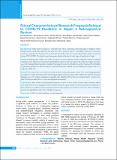Please use this identifier to cite or link to this item:
https://hdl.handle.net/20.500.14356/1075| Title: | Ethical Characteristics of Research Proposals Related to COVID-19 Pandemic in Nepal: A Retrospective Review |
| Authors: | Ghimire, Namita Hamal, Pawan Kumar Panthee, Asmita Vaidya, Anju Khadka, Mira Mahato, Namra Kumar Karn, Mukesh Kumar Verma, Shashi Dhimal, Meghnath Ghimire, Prakash Gyanwali, Pradip |
| Citation: | GhimireN., HamalP. K., PantheeA., VaidyaA., KhadkaM., MahatoN. K., KarnM. K., VermaS., DhimalM., GhimireP., & GyanwaliP. (2021). Ethical Characteristics of Research Proposals Related to COVID-19 Pandemic in Nepal: A Retrospective Review. Journal of Nepal Health Research Council, 19(1), 148-153. https://doi.org/10.33314/jnhrc.v19i1.3373 |
| Issue Date: | 2021 |
| Publisher: | Nepal Health Research Council |
| Article Type: | Original Article |
| Keywords: | COVID-19 ethics pandemic research proposals |
| Series/Report no.: | Jan-March, 2021;3373 |
| Abstract: | Abstract Background: Public health emergency is vulnerable time where maintaining ethical principles is obligatory while doing research, on the other hand, it is the same time when breach in ethics is much likely whenever a researcher is unaware, unprepared or hastens to do research. The aim of this study was to assess ethical issues of the coronavirus disease 2019 (COVID-19) related research proposals submitted during the early stages of pandemic in Nepal. Methods: Retrospective analysis of COVID-19 related research proposals and their informed consent document submitted to the ethical review board at Nepal Health Research Council was done for the study. The analysis was done as per the National Ethical Guidelines, Standard Operating Procedure for Health Research in Nepal and World Health Organization guidelines for infectious disease outbreak, 2016 under ethically relevant headings. Descriptive data were analyzed in SPSS v24. Results: The major issues were observed in the informed consent documents where 55% were lacking principal investigator’s contact information, 68% not having participant selection criteria, 70% without clear informed consent taking process, 57% without explanation of possible risks. Similarly, 68% of the interventional studies’ consent form didn’t mention possible adverse events and mitigation mechanisms. Conclusions: Most of the research proposals related to COVID-19 were devoid of major ethical elements which took longer time for receiving approval and eventually delayed the opportunity for evidence generation in critical time. More attention is needed to increase awareness and to develop capacity of researchers, reviewers, ethics committees and relevant stakeholders at the time of health emergencies. Keywords: COVID-19; ethics pandemic; research proposals |
| Description: | Original Article |
| URI: | http://103.69.126.140:8080/handle/20.500.14356/1075 |
| ISSN: | Print ISSN: 1727-5482; Online ISSN: 1999-6217 |
| Appears in Collections: | Vol. 19 No. 1 (2021): Vol. 19 No. 1 Issue 50 Jan-Mar 2021 |
Files in This Item:
| File | Description | Size | Format | |
|---|---|---|---|---|
| 3373-Manuscript-21567-2-10-20210430.pdf | Fulltext Download | 283.73 kB | Adobe PDF |  View/Open |
Items in DSpace are protected by copyright, with all rights reserved, unless otherwise indicated.
